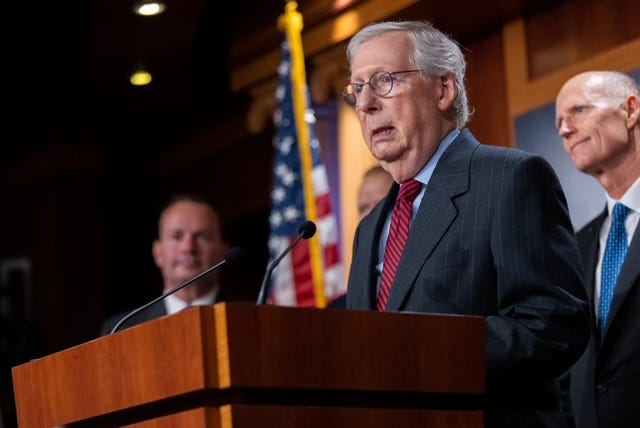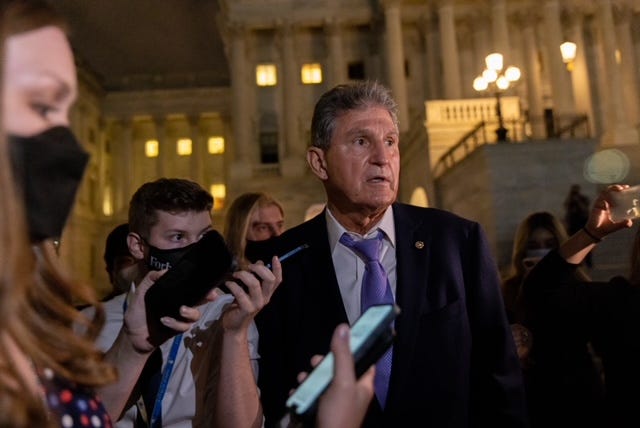by Gabe Fleisher
Good morning! It’s Friday, December 10, 2021. Election Day 2022 is 333 days away. Election Day 2024 is 1,061 days away.
Washington got a hint of bipartisanship this week. It’s not likely to last.
The leaders of the Senate did something odd on Thursday. They worked together.
After months of bickering over the debt ceiling, Democrats and Republicans came together to approve a compromise that will avert a catastrophic default.
The deal itself was wrapped in a complex parliamentary maneuver: Basically, the Senate passed a bill on Thursday that will prevent automatic spending cuts to Medicare and other programs that were set to go into effect at the end of the year.
But that bill also set up a process that will allow the Senate, in a separate piece of legislation, to lift the debt ceiling by majority vote, a one-time-only exception to the 60-vote filibuster threshold. (That way, for the actual debt ceiling hike, which will be voted on before the default deadline next week, only Democrats will need to vote “yea.”)
Even though Senate Minority Leader Mitch McConnell (R-KY) had spent months insisting that Democrats would have to raise the debt ceiling alone using the time-consuming reconciliation process, he was one of 14 Republicans to advance the compromise measure on Thursday — and then one of 9 to vote for its final passage.

It wasn’t the only whiff of bipartisanship in the Capitol halls. Hours earlier, Democratic and Republicans came together to salute Sen. Bob Dole (R-KS), who died on Sunday and was lying in state in the Capitol rotunda.
A tribute ceremony on Thursday included plenty of across-the-aisle paeans to the Kansas Republican’s decades of public service. House Speaker Nancy Pelosi (D-CA) said it was “hard to think of anyone who was more worthy to have a flag draped over his coffin, because of his great patriotism to our country.”
President Joe Biden, who served and sparred with Dole in the Senate, called the former Republican presidential nominee “a giant of our history” and “one of our greatest patriots.”
Biden also quoted from Dole’s final words, which were a call for a renewal of bipartisanship in Washington. “When we prioritize principles over party and humanity over personal legacy, we accomplish far more as a nation,” Dole wrote in a Washington Post op-ed published posthumously. “By leading with a shared faith in each other, we become America at its best: a beacon of hope, a source of comfort in crisis, a shield against those who threaten freedom.”
“Our nation has certainly faced periods of division,” Dole added. “But at the end of the day, we have always found ways to come together. We can find that unity again.”
But it’s unlikely that Thursday’s brief wave of unity will last long. Next week, it will be back to reality on Capitol Hill. In the House, votes are expected on a resolution holding former Trump White House chief of staff (and House member) Mark Meadows in contempt of Congress and a bill responding to a controversy sparked by Islamophobic comments by Rep. Lauren Boebert (R-CO).
The two measures are a reminder of how toxic things have gotten on the Hill since the January 6 riot, with Republicans boycotting the panel investigating the deadly attack on their workplace, far-left and far-right lawmakers sniping at each other in the hallways, and death threats rising.
Meanwhile, in the Senate, attention will return to the Build Back Better Act, the sweeping spending package Democrats are passing through the one-party reconciliation process, without any Republican participation. (Democrats are hoping to pass the package by Christmas; Sen. Joe Manchin is not yet on board, but they might go ahead with a vote anyway.)
Why, then, were the two parties able to eventually come together on the debt ceiling? Members and staffers were taken aback by the deal between McConnell and Senate Majority Leader Chuck Schumer (D-NY): “It was some of the most involved face-to-face negotiating the two Senate leaders conducted all year — and it surprised almost everyone,” Politico’s Burgess Everett and Marianne LeVine noted in a story on the behind-the-scenes machinations of the deal.

As he acknowledged the last time he helped avert a debt ceiling crisis, in October (though he said then he wouldn’t do it again), McConnell’s willingness to strike a deal on the debt ceiling might have been due to a fear that Democrats will blow up the filibuster if he didn’t.
Indeed, internal Democratic conversations on the “nuclear option” — which would eliminate the need for 60 votes to advance bills through the Senate — are continuing, with Democrats huddling in Schumer’s office every week. (Manchin, who opposes that idea, has also done some freelancing, holding bipartisan talks on changing the Senate rules with some Republican colleagues.)
As of now, at least, Democrats don’t have the votes to “go nuclear.” But it’s worth paying attention as they continue twisting arms, and it’s worth watching whether McConnell will fold in any other showdowns in hopes of rescuing the filibuster, which he has used to great effect in his time in Senate leadership.
In a speech on Thursday, Schumer thanked McConnell for “working with us in good faith” on the debt ceiling. “We did this with no brinksmanship, no default on debt, no risk of another recession,” Schumer added. “It was responsible governing that won the day.”
At least for that brief, shining moment, Bob Dole — himself a former Senate majority leader and consummate dealmaker — would have been proud.
What else you should know
→ Inflation is rising. U.S. inflation reached a 39-year high in November, according to a Labor Department report released this morning.
→ Boosters for teens. The FDA and CDC approved the Pfizer booster shots for 16- and 17-year-olds on Thursday.
→ A win for the 1/6 committee. A federal appeals court rejected former President Donald Trump’s bid to shield White House documents from the House committee investigating the January 6 committee. Trump is likely to appeal to the Supreme Court.
→ New York governor’s race. New York Attorney General Letitia James dropped out of the state’s Democratic gubernatorial primary on Thursday. Her announcement came hours after reports that she plans to subpoena Trump in a civil fraud investigation.

Ask Gabe
I’m taking a question that came into response to an item in “Daybook” yesterday, on President Biden’s call with the Bucharest Nine:
Q: Could you go into some depth on the Bucharest Nine? Are they an “official” group? Do they work together? Are they all members of the EU? NATO? — Kathleen H.
A: The Bucharest Nine — also known as the B9 — is an official group, founded in 2015. The nine members are Bulgaria, the Czech Republic, Estonia, Hungary, Latvia, Lithuania, Poland, Romania, Slovakia. They are all members of the European Union and of NATO (in fact, they make up the eastern-most members of NATO), so the group is just a regional-specific coalition largely formed to counter the threat posed by Russia (which is the topic they were discussing with Biden on Thursday).
The organization was formed after Russia’s aggression against Ukraine in 2014 and is now mobilizing again as “the eastern voice of NATO” as Moscow builds up troops on its border with Ukraine; all nine countries are either former Soviet states are were once part of the Soviet sphere of influence.
Corrections
In Wednesday’s newsletter, I listed the wrong home state for Sen. John Tester. He is from Montana.
My apologies for the error, and thanks to the readers who pointed it out!
Daybook
All times Eastern.
→ President Joe Biden will receive his daily intelligence briefing at 9 a.m. Then, at 11 a.m., he and First Lady Jill Biden will attend the memorial service for the late Sen. Bob Dole (R-KS) at the Washington National Cathedral. The president will deliver remarks.
At 1:45 p.m., the president will deliver closing remarks at the virtual Summit for Democracy. At 3 p.m., the first lady will visit Joint Base Myer-Henderson Hall in Arlington, Virginia, to participate in a Toys for Tots drive with military families.
At 5:45 p.m., both Bidens will depart for their home in Wilmington, Delaware. They will touch down at 6:40 p.m. and spend the weekend there. Finally, at 11:35 p.m., the president will appear virtually on NBC’s “The Tonight Show Starring Jimmy Fallon,” his first late-night appearance since taking office.
→ Vice President Kamala Harris and Second Gentleman Doug Emhoff will also attend the Dole memorial service. At 3 p.m., Harris will ceremonially swear in former Sen. Jeff Flake (R-AZ), who crossed party lines to endorse Biden in the 2020 election, as the U.S. ambassador to Turkey.
Finally, at 4:15 p.m., Harris and Emhoff will host a group of elementary school students for an outdoor holiday celebration at the vice presidential residence.
→ White House Press Secretary Jen Psaki will hold her daily press briefing at 12:30 p.m.
→ U.S. public health officials will hold a press briefing at 3:30 p.m. on the Covid-19 response. Participants will include Dr. Anthony Fauci, the president’s chief medical adviser; Dr. Vivek Murthy, the U.S. surgeon general; Dr. Rochelle Walensky, the CDC director; and Jeff Zients, the White House Covid-19 response coordinator.
→ The House and Senate are not in session today.
→ The Supreme Court justices will meet for their weekly private conference and release opinions at 10 a.m.
It is rare for the justices to release opinions on a Friday, leading some legal experts to speculate that the court could be preparing to hand down its ruling on S.B. 8, the Texas law banning abortions in the state after about six weeks of pregnancy. (The opinions could be for other cases, however.)






